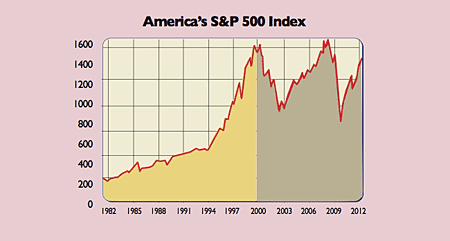
Stocks supposedly always go up over the long run. But since 2000, America’s S&P 500, which sets the tone for world markets, has fallen by 15%. The FTSE 100 is still down by a fifth. The bad news is that the pattern we’ve seen since 2000 is likely to last a few years yet.
That’s because we’re in a long-term, or secular, bear market, says John Mauldin on Investorsinsight.com. A century of history shows that equities move in long valuation cycles. Movements from high price/earnings (p/e) ratios to low ones are known as secular bears; swings from low p/es to high ones are secular bulls. The average bull or bear cycle lasts 13 years. Some take up to 20.
During secular bear markets, stocks don’t necessarily fall all the time. They can drift sideways as earnings gradually catch up with valuations, as occurred in 1966-1982. The overall sideways movement can be punctuated with large rallies and declines, such as the upswing of 2003-2007 and the subsequent bust.
The last long-term bull run started in 1982, when valuations hit historic lows and began a long rise to record levels at the peak of the tech bubble in 2000. The S&P’s cyclically adjusted p/e ratio (CAPE), which takes the average of earnings over the past ten years in order to smooth out the effects of the business cycle, has since declined from its record of 45. But it has yet to fall to the single-digit levels that mark the end of long-term bear markets: it is still around 20, far above the average since 1881 of 16.4. This suggests that the bear has unfinished business.
The FTSE is affected by US market trends, but has its own 200-year history of long-term up- and down swings, says market historian David Schwartz in the FT. Fifteen years of outperformance is followed by 15 years of under-performance. So history suggests stocks will struggle for four or five more years.
The macroeconomic backdrop also suggests that we are in a secular bear. Just as the 1982-2000 bull was fuelled by the defeat of inflation, deregulation and strong growth, the Western world “will not easily recover from the current level of debt overhang”, says Jeremy Grantham of investment management group GMO. Ongoing deleveraging will dampen growth prospects over the next few years. It’s hard to see stocks embarking on another long-term upswing until we have fully recovered from the bursting of the credit bubble.